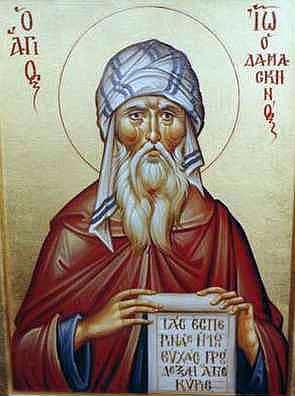John of Damascus was an 8th century Church leader in
Muslim-controlled Syria who wrote a number of texts against Islam. They seem to
have been the first written polemics against the Muslim faith ever written by a
Christian.
Daniel J. Sahas' book "John of Damascus on Islam" contains the polemical texts, which are rather short, and an extended analysis of the background, written by Sahas himself.
John of Damascus was a high official at the Muslim court in Damascus before retiring to a monastery. He was also the grandchild of Mansur b. Sargun, who played an important role in the surrender of Damascus to the Muslims in 635. It's not clear whether Mansur was the actual bishop of the city, or an associate of the bishop. Apparently, Mansur then became a high-ranking civil servant in the Muslim Umayyad administration. The Mansur family may have been ethnically Arab, although this is unclear, since Arab names were sometimes taken by non-Arabs as well. The Umayyads had no particular problem using Christians in their administration, and even the introduction of the Arab language took some time to accomplish.
It's somewhat ironic that a person with *this* particular background wrote the first known Christian polemic against Islam! Otherwise, John of Damascus is most known for his defence of the holy icons against the iconoclastic emperors of Byzantium.
Personally, I find John's polemic against Islam rather uninteresting. It belabours all the usual points of controversy: the Muslim rejection of the cross and crucifixion, the Christian claim that Jesus was the Son of God, Muhammad's polygamy, the Muslim notion that God is responsible for both good and evil, etc. John's main argument against Islam is that Muhammad's revelations were given in secret, while those of Moses were public (all Israel saw God descending on Mount Horeb to meet Moses). Also, Jesus was foretold by the Old Testament prophets and worked miracles to prove his status, while Muhammad isn't mentioned in the Bible and didn't make miracles. Apparently, one Muslim counter-argument was that the Christians had been deceived by false scriptures deliberately planted by the Jews. This reminds me of the modern quip "Christianity is a Jewish joke on the Gentiles"! John further attacks the Muslim veneration of the black stone at Kaba, claiming that this is more idolatrous than Christian veneration of the cross.
The most intriguing statement is the claim that Muhammad got his inspiration from an Arian monk, showing that John still somehow regarded Islam as a Christian heresy. The Arians, of course, were the 4th century heretics who denied the divinity of Christ and thus the Trinity.
Another thing that surprised me was the hostile tone of the polemic, with John accusing Islam of being the forerunner of the Anti-Christ, mocking various suras in the Koran, etc. And this from a person whose family spent most of their lives serving the Muslim caliphs!
"John of Damascus on Islam" is a scholarly study and obviously intended for a scholarly audience. I don't think it's of much interest to the general reader, but it's probably indispensable for students of Islam and early Muslim-Christian relations.

No comments:
Post a Comment